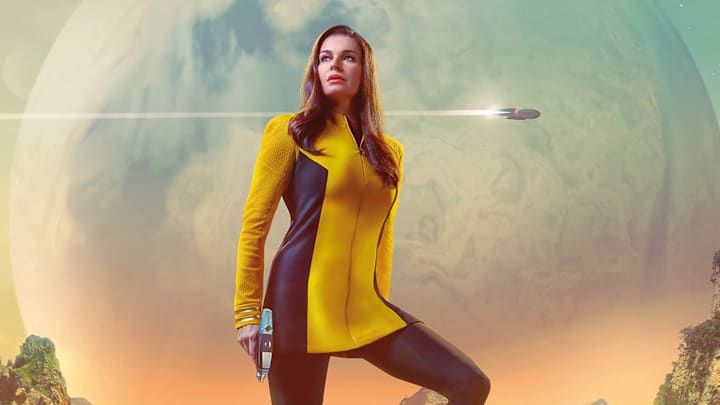While all Number Ones are commendable and frequently tag in to save the day in Star Trek, two officers in particular upstage all the rest.
Of course, we're talking about Una and Spock!
Una Chin-Riley
The ethically altered Illyrian competency runs the gamut. She’s hyperintelligent, multilingual, and packs a punch when needed. Although we've only seen a few seasons' worth of her talent, it is clear she has an underlying, commanding aura about her.
In Ghosts of Illyria (SNW S01E03), Pike was trapped by an ion storm, so Una took over command while a contagion consumed the ship. Infected herself, like a true commander, Una juggled irrational behavior from the crew while quickly solving problems around the starship. On top of keeping the Enterprise together, she also helped cure that pesky contagion.
Despite her genetic superiority making Una a sort of secret superhero, she stayed incredibly grounded and calm even in the most emotionally taxing situations. She also lacks a huge ego and openly admitted to Pike that she lied on her applications. An honorable move that proves Una’s moral compass isn’t skewed.
That level-headedness works great both in combat, the courtroom, and face-to-face. An often overlooked skill, maintaining good morale, is pivotal when your Starship requires dozens of people to operate correctly. Una carries a high standard of mentorship and honestly listens to her crewmates, including the doomed Captain Pike. She isn't just a pretty face on a Starfleet Academy poster; she fully embodies the ethos of Starfleet, inside and out.
Why isn't she captain yet?
Politics. Probably.
Although the show has not yet addressed Una’s interest in future command, the hiding of her identity and subsequent trial in Ad Astra per Aspera (SNW S02E02) may stall her climb to the top. Starfleet’s ban on genetic modification is never officially lifted, although more and more exceptions are made. Una had better ready herself for a lifelong battle of advocating.
Spock
No debate needed: Spock is the definitive best first officer in all of Starfleet. Honestly, probably the most competent character in all of Trek.
There are too many examples of Spock’s awesomeness to list, but a good episode highlighting his leadership abilities is The Galileo Seven (TOS S01E16). Stranded on a hostile planet, Spock took up command and leaned heavily on logical roots. Although the crew didn’t fully trust this approach, Spock proved his efforts worthy, cementing him as a methodical and intelligent leader.
The acclaimed Vulcan is also a celebrated and warrior-like scientist, often placing himself in dangerous situations to better understand an unknown obstacle. In The Immunity Syndrome (TOS S02E18), Spock took a shuttle into a mysterious ameba that killed a ship full of Vulcans. He was tortured physically and mentally while studying the entity, but ultimately found a way to destroy it.
In Star Trek: The Motion Picture, Spock again dived headfirst into danger, this time inside the terrifying monstrosity called V’ger. Spock liked getting down and dirty with his scientific experiments, adding a level of bravery that even Kirk couldn’t muster.
Why was he never officially a captain?
He was the captain! Kind of… Throughout his very long and illustrious career, Spock was acting-captain once or twice and was officially captain, such as in Star Trek II: Wrath of Khan. His place in the chair was short-lived, however, as he ceded his command to Jim Kirk, who was the more logical match for Khan.
After his resurrection in Star Trek III: The Search for Spock, he continued to lead missions for Starfleet and various science teams, but only ever as an Ambassador or some other high-ranking position. He continued to accomplish as much as a Starfleet captain, but seemed disinterested in securing such a coveted title.
His reasoning was a personal one. Glory and validation are human qualities, and Spock was always more interested in his Vulcan side. Science and knowledge were what Spock championed, not titles and status. The spiritual half-human also dedicated a large part of his time towards connecting with and upholding his Vulcan roots, such as his attempt at the pivotal Kolinahr. Spock’s chosen fields required years and years of study and research; thus, captaining was always a side gig.
